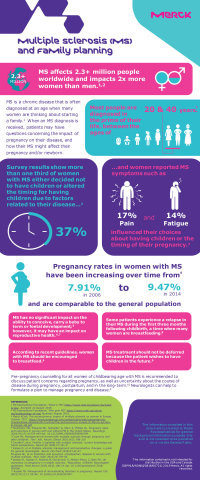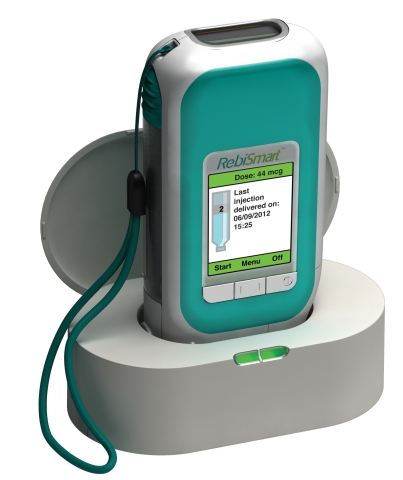DARMSTADT, Germany--(BUSINESS WIRE)--Merck, a leading science and technology company, today announced that the Committee for Medicinal Products for Human Use (CHMP) of the European Medicines Agency (EMA) has issued a positive opinion to update the product label of Rebif®, an interferon beta-1a, to include that women with relapsing multiple sclerosis (RMS) may continue treatment with Rebif during pregnancy if clinically needed and while breastfeeding.
“At Merck, we are committed to supporting patients with MS at every stage of their journey, including when making decisions about starting or expanding their family,” said Dr. Maria Rivas, Chief Medical Officer, Healthcare, Merck. “Today’s CHMP positive opinion, to use Rebif during pregnancy if clinically needed and while breastfeeding, offers physicians a vital option for managing this chronic disease during a very important time in their patients’ lives.”
MS is a chronic disease affecting twice as many women as men2 and is often diagnosed between the ages of 20-40 years.1 A survey of women throughout Europe showed that more than one third of women with MS decided not to have children or altered the timing for having children due to concerns related to their MS.3 With Rebif, RMS treatment may be continued during pregnancy if clinically needed. Additionally, Rebif can be used while breastfeeding, which is important as many patients experience a relapse in their MS during the first three months following childbirth.4
“The interferon beta label update is critically important because now physicians have options for treating women with relapsing MS into the beginning of pregnancy and if clinically needed during pregnancy and breastfeeding,” said Professor Kerstin Hellwig, Department of Neurology at St. Josef Hospital, Bochum, Germany. “Interferon beta therapy has been approved for more than 20 years and, in that time, vital data have been collected that provide patients and physicians the confidence to consider treatment with interferon beta in this setting.”
More than 4,000 pregnancy outcomes from registries and post-marketing experience indicate no increased risk of major congenital anomalies after pre-conception exposure to interferon beta (IFNß) or exposure during the first trimester of pregnancy. It should be noted that the duration of exposure during the first trimester is uncertain, because data were collected when IFNß use was contraindicated during pregnancy, and treatment was likely interrupted when the pregnancy was detected and/or confirmed. Experience with exposure during the second and third trimesters is very limited. If clinically needed, the continued use of Rebif may be considered once a pregnancy has been confirmed, as directed by the treating physician.
The label update also includes that Rebif can be used during breastfeeding, another important area of unmet need for mothers with RMS who wish to breastfeed. According to the new label, levels of IFNß excreted in breast milk are negligible. No harmful effects on the breastfed newborn/infant are anticipated.
The CHMP positive opinion also removed the previous contraindication against treatment initiation during pregnancy as well as the requirement to use contraception while on Rebif. To learn more about Rebif and family planning in MS, visit merckneurology.com.
About Rebif®
Rebif® (interferon beta-1a) is a disease-modifying drug used to treat relapsing forms of multiple sclerosis (MS) and is similar to the interferon beta protein produced by the human body. The efficacy of Rebif® in chronic progressive MS has not been established. The exact mechanism is unknown.
Rebif®, which was approved in Europe in 1998 and in the US in 2002, is registered in more than 90 countries worldwide.
Rebif® can be administered with the RebiSmart® electronic auto-injection device (not approved in the US), or with the RebiDose® single-use disposable pen, or the manual multidose injection pen RebiSlide™. Rebif® can also be administered with the autoinjector Rebiject II® or by manual injection using ready-to-use pre-filled syringes. These injection devices are not approved in all countries.
In January 2012, the European commission approved the extension of the indication of Rebif® in early multiple sclerosis.
Rebif® should be used with caution in patients with a history of depression, liver disease, thyroid abnormalities and seizures. Most commonly reported side effects are flu-like symptoms, injection site disorders, elevation of liver enzymes and blood cell abnormalities. Patients, especially those with depression, seizure disorders, or liver problems, should discuss treatment with Rebif® with their doctors.
About Multiple Sclerosis
Multiple sclerosis (MS) is a chronic, inflammatory condition of the central nervous system and is the most common non-traumatic, disabling neurological disease in young adults. It is estimated that approximately 2.3 million people have MS worldwide. While symptoms can vary, the most common symptoms of MS include blurred vision, numbness or tingling in the limbs and problems with strength and coordination. The relapsing forms of MS are the most common.
Merck in Neurology and Immunology
Merck has a long-standing legacy in neurology and immunology, with significant R&D and commercial experience in multiple sclerosis (MS). The company`s current MS portfolio includes two products for the treatment of relapsing MS, with a robust pipeline focusing on discovering new therapies that have the potential to modulate key pathogenic mechanisms in MS. Merck aims to improve the lives of those living with MS, by addressing areas of unmet medical needs.
The company`s robust immunology pipeline focuses on discovering new therapies that have the potential to modulate key pathogenic mechanisms in chronic diseases such as MS, systemic lupus erythematosus (SLE) and forms of arthritis, including rheumatoid arthritis (RA) and osteoarthritis (OA).
All Merck Press Releases are distributed by e-mail at the same time they become available on the Merck Website. Please go to www.merckgroup.com/subscribe to register online, change your selection or discontinue this service.
About Merck
Merck, a leading science and technology company, operates across healthcare, life science and performance materials. Around 52,000 employees work to make a positive difference to millions of people’s lives every day by creating more joyful and sustainable ways to live. From advancing gene editing technologies and discovering unique ways to treat the most challenging diseases to enabling the intelligence of devices – the company is everywhere. In 2018, Merck generated sales of € 14.8 billion in 66 countries.
Scientific exploration and responsible entrepreneurship have been key to Merck’s technological and scientific advances. This is how Merck has thrived since its founding in 1668. The founding family remains the majority owner of the publicly listed company. Merck holds the global rights to the Merck name and brand. The only exceptions are the United States and Canada, where the business sectors of Merck operate as EMD Serono in healthcare, MilliporeSigma in life science, and EMD Performance Materials.
1 MS International Foundation. What is MS? https://www.msif.org/about-ms/what-is-ms/. Accessed 14 August 2019.
2 MS International Foundation. Who Gets MS? https://www.msif.org/about-ms/epidemiology-of-ms/. Accessed 14 August 2019.
3 Merck KGaA, Darmstadt, Germany. The socioeconomic impact of multiple sclerosis on women in Europe. https://www.emdgroup.com/content/dam/web/corporate/non-images/press-releases/2017/oct/us/The-socioeconomic-impact-of-MS-on-women-in-Europe-US.pdf 14 August 2019.
4 Hughes SE, et al. Predictors and dynamics of postpartum relapses in women with multiple sclerosis. Mult. Scler 2014;20:739-46.






